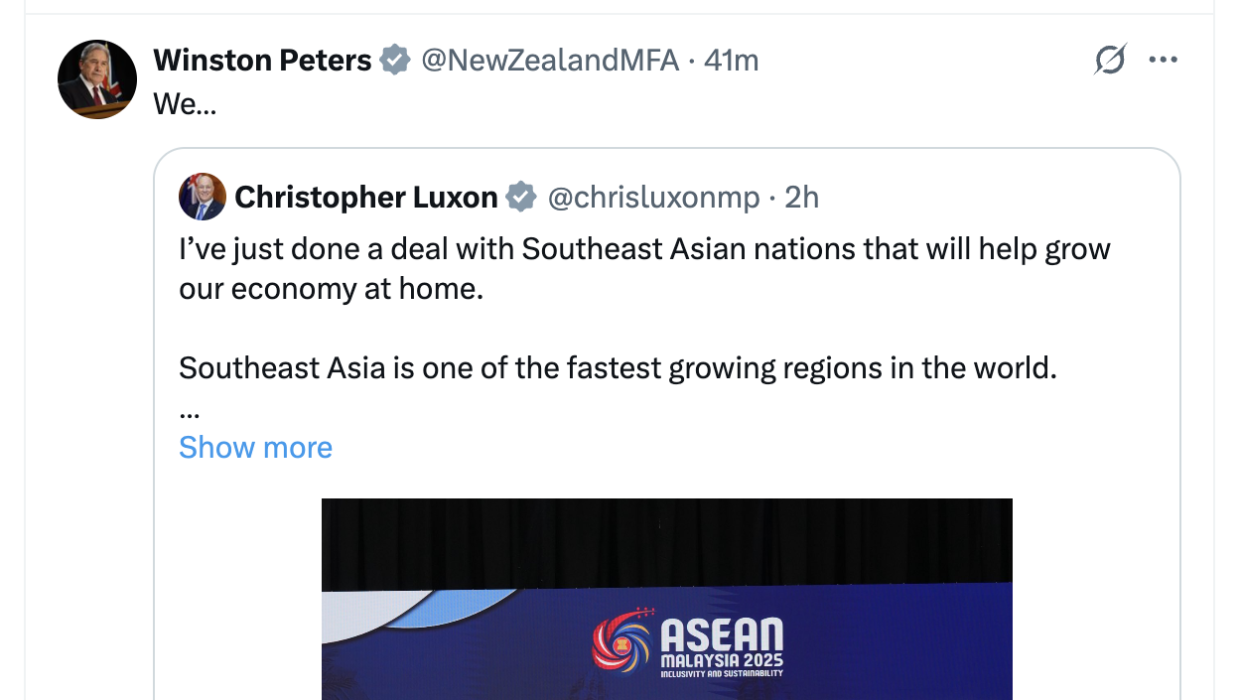Business
Luxon Claims Trade Deal Success While Foreign Minister Takes Collective Approach

New Zealand’s Prime Minister, Christopher Luxon, announced a significant trade deal with several Southeast Asian nations, asserting that this agreement will enhance the nation’s economic landscape. The announcement, made in October 2023, marks a pivotal moment for New Zealand’s international trade relations, particularly with countries that are integral to the Asia-Pacific region.
The Prime Minister’s post, which has since been deleted, highlighted his personal involvement in securing the deal. Luxon stated, “I have just completed a deal that will drive economic growth.” This statement emphasizes his individual role in the negotiations, contrasting with the more collaborative tone of the Minister of Foreign Affairs, who referred to the achievement as a collective success.
This divergence in messaging raises questions about the administration’s communication strategy and the emphasis on individual versus collective success. The Minister’s account, which referred to the agreement in the plural sense of “we,” suggests a team effort in the negotiations, possibly indicating a more diplomatic approach to international relations.
In recent years, New Zealand has sought to strengthen its trade ties with Southeast Asia, recognizing the region’s growing economic importance. The Prime Minister’s announcement reflects a broader strategy aimed at diversifying New Zealand’s trade partnerships, especially in light of changing global dynamics.
Luxon’s administration aims to position New Zealand as a competitive player in the Asia-Pacific market, where countries such as Singapore, Vietnam, and Malaysia are increasingly significant. By expanding trade relationships, the government hopes to bolster exports and stimulate local industries.
Economic analysts predict that this deal could lead to increased job opportunities within New Zealand and provide access to new markets for local businesses. Specific details regarding the sectors that will benefit from the trade agreement have yet to be disclosed, but the general sentiment among economic experts leans towards optimism regarding potential growth.
As the Prime Minister continues to promote this achievement, the differing narratives from his office and the Foreign Affairs Ministry could signify internal discussions about how best to showcase New Zealand’s international efforts. This situation not only illustrates the complexities of diplomatic communications but also highlights the importance of unified messaging in government.
The impact of this trade deal will likely unfold over the coming months, as businesses and consumers begin to feel the effects of enhanced trade relations with Southeast Asia. For now, the focus will remain on how both Luxon and the Minister of Foreign Affairs navigate their roles in this evolving economic landscape.
-

 Sports2 months ago
Sports2 months agoNetball New Zealand Stands Down Dame Noeline Taurua for Series
-

 Entertainment2 months ago
Entertainment2 months agoTributes Pour In for Lachlan Rofe, Reality Star, Dead at 47
-

 Entertainment3 weeks ago
Entertainment3 weeks agoNew ‘Maverick’ Chaser Joins Beat the Chasers Season Finale
-

 Sports2 months ago
Sports2 months agoSilver Ferns Legend Laura Langman Criticizes Team’s Attitude
-

 Politics4 weeks ago
Politics4 weeks agoNetball NZ Calls for Respect Amid Dame Taurua’s Standoff
-

 Entertainment2 months ago
Entertainment2 months agoKhloe Kardashian Embraces Innovative Stem Cell Therapy in Mexico
-

 World3 months ago
World3 months agoPolice Arrest Multiple Individuals During Funeral for Zain Taikato-Fox
-

 Sports2 months ago
Sports2 months agoGaël Monfils Set to Defend ASB Classic Title in January 2026
-

 Entertainment1 month ago
Entertainment1 month agoTyson Fury’s Daughter Venezuela Gets Engaged at Birthday Bash
-

 Sports1 month ago
Sports1 month agoHeather McMahan Steps Down as Ryder Cup Host After Controversy
-

 World7 days ago
World7 days agoSevere Winds Hit New Zealand, Over 100 Flights Canceled
-

 Entertainment1 month ago
Entertainment1 month agoTyson Fury’s Daughter Venezuela Gets Engaged at Birthday Bash

















